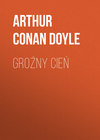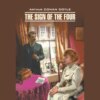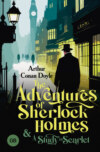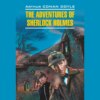Czytaj książkę: «The Great Shadow and Other Napoleon», strona 5
Chapter VIII – The coming of the cutter
I never felt quite the same to our lodger after that little business at the Peel Castle. It was always in my mind that he was holding a secret from me – indeed, that he was all a secret together, seeing that he always hung a veil over his past. And when by chance that veil was for an instant whisked away, we always caught just a glimpse of something bloody and violent and dreadful upon the other side. The very look of his body was terrible. I bathed with him once in the summer, and I saw then that he was haggled with wounds all over. Besides seven or eight scars and slashes, his ribs on one side were all twisted out of shape, and a part of one of his calves had been torn away. He laughed in his merry way when he saw my face of wonder.
"Cossacks! Cossacks!" said he, running his hand over his scars. "And the ribs were broke by an artillery tumbril. It is very bad to have the guns pass over one. Now with cavalry it is nothing. A horse will pick its steps however fast it may go. I have been ridden over by fifteen hundred cuirassiers A and by the Russian hussars of Grodno, and I had no harm from that. But guns are very bad."
"And the calf?" I asked.
"Pouf! It is only a wolf bite," said he. "You would not think how I came by it! You will understand that my horse and I had been struck, the horse killed, and I with my ribs broken by the tumbril. Well, it was cold – oh, bitter, bitter! – the ground like iron, and no one to help the wounded, so that they froze into such shapes as would make you smile. I too felt that I was freezing, so what did I do? I took my sword, and I opened my dead horse, so well as I could, and I made space in him for me to lie, with one little hole for my mouth. Sapristi! It was warm enough there. But there was not room for the entire of me, so my feet and part of my legs stuck out. Then in the night, when I slept, there came the wolves to eat the horse, and they had a little pinch of me also, as you can see; but after that I was on guard with my pistols, and they had no more of me. There I lived, very warm and nice, for ten days."
"Ten days!" I cried. "What did you eat?"
"Why, I ate the horse. It was what you call board and lodging to me. But of course I have sense to eat the legs, and live in the body. There were many dead about who had all their water bottles, so I had all I could wish. And on the eleventh day there came a patrol of light cavalry, and all was well."
It was by such chance chats as these – hardly worth repeating in themselves – that there came light upon himself and his past. But the day was coming when we should know all; and how it came I shall try now to tell you.
The winter had been a dreary one, but with March came the first signs of spring, and for a week on end we had sunshine and winds from the south. On the 7th Jim Horscroft was to come back from Edinburgh; for though the session ended with the 1st, his examination would take him a week. Edie and I were out walking on the sea beach on the 6th, and I could talk of nothing but my old friend – for, indeed, he was the only friend of my own age that I had at that time. Edie was very silent, which was a rare thing with her; but she listened smiling to all that I had to say.
"Poor old Jim!" said she once or twice under her breath. "Poor old Jim!"
"And if he has passed," said I, "why, then of course he will put up his plate and have his own house, and we shall be losing our Edie."
I tried to make a jest of it and to speak lightly, but the words still stuck in my throat.
"Poor old Jim!" said she again, and there were tears in her eyes as she said it. "And poor old Jock!" she added, slipping her hand into mine as we walked. "You cared for me a little bit once also, didn't you, Jock? Oh, is not that a sweet little ship out yonder!"
It was a dainty cutter of about thirty tons, very swift by the rake of her masts and the lines of her bow. She was coming up from the south under jib, foresail, and mainsail; but even as we watched her all her white canvas shut suddenly in, like a kittiwake closing her wings, and we saw the splash of her anchor just under her bowsprit. She may have been rather less than a quarter of a mile from the shore – so near that I could see a tall man with a peaked cap, who stood at the quarter with a telescope to his eye, sweeping it backwards and forwards along the coast.
"What can they want here?" asked Edie.
"They are rich English from London," said I; for that was how we explained everything that was above our comprehension in the border counties. We stood for the best part of an hour watching the bonny craft, and then, as the sun was lying low on a cloudbank and there was a nip in the evening air, we turned back to West Inch.
As you come to the farmhouse from the front, you pass up a garden, with little enough in it, which leads out by a wicket-gate to the road; the same gate at which we stood on the night when the beacons were lit, the night that we saw Walter Scott ride past on his way to Edinburgh. On the right of this gate, on the garden side, was a bit of a rockery which was said to have been made by my father's mother many years before. She had fashioned it out of water-worn stones and sea shells, with mosses and ferns in the chinks. Well, as we came in through the gates my eyes fell upon this stone heap, and there was a letter stuck in a cleft stick upon the top of it. I took a step forward to see what it was, but Edie sprang in front of me, and plucking it off she thrust it into her pocket.
"That's for me," said she, laughing. But I stood looking at her with a face which drove the laugh from her lips.
"Who is it from, Edie?" I asked.
She pouted, but made no answer.
"Who is it from, woman?" I cried. "Is it possible that you have been as false to Jim as you were to me?"
"How rude you are, Jock!" she cried. "I do wish that you would mind your own business."
"There is only one person that it could be from," I cried. "It is from this man de Lapp!"
"And suppose that you are right, Jock?"
The coolness of the woman amazed and enraged me.
"You confess it!" I cried. "Have you, then, no shame left?"
"Why should I not receive letters from this gentleman?"
"Because it is infamous."
"And why?"
"Because he is a stranger."
"On the contrary," said she, "he is my husband!"
Chapter IX – The doings at west inch
I can remember that moment so well. I have heard from others that a great, sudden blow has dulled their senses. It was not so with me. On the contrary, I saw and heard and thought more clearly than I had ever done before. I can remember that my eyes caught a little knob of marble as broad as my palm, which was imbedded in one of the grey stones of the rockery, and I found time to admire its delicate mottling. And yet the look upon my face must have been strange, for Cousin Edie screamed, and leaving me she ran off to the house. I followed her and tapped at the window of her room, for I could see that she was there.
"Go away, Jock, go away!" she cried. "You are going to scold me! I won't be scolded! I won't open the window! Go away!"
But I continued to tap.
"I must have a word with you!"
"What is it, then?" she cried, raising the sash about three inches. "The moment you begin to scold I shall close it."
"Are you really married, Edie?"
"Yes, I am married."
"Who married you?"
"Father Brennan, at the Roman Catholic Chapel at Berwick."
"And you a Presbyterian?"
"He wished it to be in a Catholic Church."
"When was it?"
"On Wednesday week."
I remembered then that on that day she had driven over to Berwick, while de Lapp had been away on a long walk, as he said, among the hills.
"What about Jim?" I asked.
"Oh, Jim will forgive me!"
"You will break his heart and ruin his life."
"No, no; he will forgive me."
"He will murder de Lapp! Oh, Edie, how could you bring such disgrace and misery upon us?"
"Ah, now you are scolding!" she cried, and down came the window.
I waited some little time, and tapped, for I had much still to ask her; but she would return no answer, and I thought that I could hear her sobbing. At last I gave it up; and I was about to go into the house, for it was nearly dark now, when I heard the click of the garden gate. It was de Lapp himself.
But as he came up the path he seemed to me to be either mad or drunk. He danced as he walked, cracked his fingers in the air, and his eyes blazed like two will-o'-the-wisps. "Voltigeurs!" he shouted; "Voltigeurs de la Garde!" just as he had done when he was off his head; and then suddenly, "En avant! en avant!" and up he came, waving his walking-cane over his head. He stopped short when he saw me looking at him, and I daresay he felt a bit ashamed of himself.
"Hola, Jock!" he cried. "I didn't thought anybody was there. I am in what you call the high spirits to-night."
"So it seems!" said I, in my blunt fashion. "You may not feel so merry when my friend Jim Horscroft comes back to-morrow."
"Ah! he comes back to-morrow, does he? And why should I not feel merry?
"Because, if I know the man, he will kill you."
"Ta, ta, ta!" cried de Lapp. "I see that you know of our marriage. Edie has told you. Jim may do what he likes."
"You have given us a nice return for having taken you in."
"My good fellow," said he, "I have, as you say, given you a very nice return. I have taken Edie from a life which is unworthy of her, and I have connected you by marriage with a noble family. However, I have some letters which I must write to-night, and the rest we can talk over to-morrow, when your friend Jim is here to help us."
He stepped towards the door.
"And this was whom you were awaiting at the peel tower!" I cried, seeing light suddenly.
"Why, Jock, you are becoming quite sharp," said he, in a mocking tone; and an instant later I heard the door of his room close and the key turn in the lock.
I thought that I should see him no more that night; but a few minutes later he came into the kitchen, where I was sitting with the old folk.
"Madame," said he, bowing down with his hand over his heart, in his own queer fashion, "I have met with much kindness in your hands, and it shall always be in my heart. I didn't thought I could have been so happy in the quiet country as you have made me. You will accept this small souvenir; and you also, sir, you will take this little gift, which I have the honour to make to you."
He put two little paper packets down upon the table at their elbows, and then, with three more bows to my mother, he walked from the room.
Her present was a brooch, with a green stone set in the middle and a dozen little shining white ones all round it. We had never seen such things before, and did not know how to set a name to them; but they told us afterwards at Berwick that the big one was an emerald and the others were diamonds, and that they were worth much more than all the lambs we had that spring. My dear old mother has been gone now this many a year, but that bonny brooch sparkles at the neck of my eldest daughter when she goes out into company; and I never look at it that I do not see the keen eyes and the long thin nose and the cat's whiskers of our lodger at West Inch. As to my father, he had a fine gold watch with a double case; and a proud man was he as he sat with it in the palm of his hand, his ear stooping to hearken to the tick. I do not know which was best pleased, and they would talk of nothing but what de Lapp had given them.
"He's given you something more," said I at last.
"What then, Jock?" asked father.
"A husband for Cousin Edie," said I.
They thought I was daffing when I said that; but when they came to understand that it was the real truth, they were as proud and as pleased as if I had told them that she had married the laird. Indeed, poor Jim, with his hard drinking and his fighting, had not a very bright name on the country-side, and my mother had often said that no good could come of such a match. Now, de Lapp was, for all we knew, steady and quiet and well-to-do. And as to the secrecy of it, secret marriages were very common in Scotland at that time, when only a few words were needed to make man and wife, so nobody thought much of that. The old folk were as pleased, then, as if their rent had been lowered; but I was still sore at heart, for it seemed to me that my friend had been cruelly dealt with, and I knew well that he was not a man who would easily put up with it.
Chapter X – The return of the shadow
I woke with a heavy heart the next morning, for I knew that Jim would be home before long, and that it would be a day of trouble. But how much trouble that day was to bring, or how far it would alter the lives of us, was more than I had ever thought in my darkest moments. But let me tell you it all, just in the order that it happened.
I had to get up early that morning; for it was just the first flush of the lambing, and my father and I were out on the moors as soon as it was fairly light. As I came out into the passage a wind struck upon my face, and there was the house door wide open, and the grey light drawing another door upon the inner wall. And when I looked again there was Edie's room open also, and de Lapp's too; and I saw in a flash what that giving of presents meant upon the evening before. It was a leave-taking, and they were gone.
My heart was bitter against Cousin Edie as I stood looking into her room. To think that for the sake of a newcomer she could leave us all without one kindly word, or as much as a hand-shake. And he, too! I had been afraid of what would happen when Jim met him; but now there seemed to be something cowardly in this avoidance of him. I was angry and hurt and sore, and I went out into the open without a word to my father, and climbed up on to the moors to cool my flushed face.
When I got up to Corriemuir I caught my last glimpse of Cousin Edie. The little cutter still lay where she had anchored, but a rowboat was pulling out to her from the shore. In the stern I saw a flutter of red, and I knew that it came from her shawl. I watched the boat reach the yacht and the folk climb on to her deck. Then the anchor came up, the white wings spread once more, and away she dipped right out to sea. I still saw that little red spot on the deck, and de Lapp standing beside her. They could see me also, for I was outlined against the sky, and they both waved their hands for a long time, but gave it up at last when they found that I would give them no answer.
I stood with my arms folded, feeling as glum as ever I did in my life, until their cutter was only a square hickering patch of white among the mists of the morning. It was breakfast time and the porridge upon the table before I got back, but I had no heart for the food. The old folk had taken the matter coolly enough, though my mother had no word too hard for Edie; for the two had never had much love for each other, and less of late than ever.
"There's a letter here from him," said my father, pointing to a note folded up on the table; "it was in his room. Maybe you would read it to us."
They had not even opened it; for, truth to tell, neither of the good folk were very clever at reading ink, though they could do well with a fine large print.
It was addressed in big letters to "The good people of West Inch;" and this was the note, which lies before me all stained and faded as I write:
"My friends, – I didn't thought to have left you so suddenly, but the matter was in other hands than mine. Duty and honour have called me back to my old comrades. This you will doubtless understand before many days are past. I take your Edie with me as my wife; and it may be that in some more peaceful time you will see us again at West Inch. Meanwhile, accept the assurance of my affection, and believe me that I shall never forget the quiet months which I spent with you, at the time when my life would have been worth a week at the utmost had I been taken by the Allies. But the reason of this you may also learn some day."
"Yours,"
"Bonaventure de Lissac"
"(Colonel des Voltigeurs de la Garde, et aide-de-camp de S.M.I. L'Empereur Napoleon.")
I whistled when I came to those words written under his name; for though I had long made up my mind that our lodger could be none other than one of those wonderful soldiers of whom we had heard so much, who had forced their way into every capital of Europe, save only our own, still I had little thought that our roof covered Napoleon's own aide-de-camp and a colonel of his Guard.
"So," said I, "de Lissac is his name, and not de Lapp. Well, colonel or no, it is as well for him that he got away from here before Jim laid hands upon him. And time enough, too," I added, peeping out at the kitchen window, "for here is the man himself coming through the garden."
I ran to the door to meet him, feeling that I would have given a deal to have him back in Edinburgh again. He came running, waving a paper over his head; and I thought that maybe he had a note from Edie, and that it was all known to him. But as he came up I saw that it was a big, stiff, yellow paper which crackled as he waved it, and that his eyes were dancing with happiness.
"Hurrah, Jock!" he shouted. "Where is Edie? Where is Edie?"
"What is it, man?" I asked.
"Where is Edie?"
"What have you there?"
"It's my diploma, Jock. I can practise when I like. It's all right. I want to show it to Edie."
"The best you can do is to forget all about Edie," said I.
Never have I seen a man's face change as his did when I said those words.
"What! What d'ye mean, Jock Calder?" he stammered.
He let go his hold of the precious diploma as he spoke, and away it went over the hedge and across the moor, where it stuck flapping on a whin-bush; but he never so much as glanced at it. His eyes were bent upon me, and I saw the devil's spark glimmer up in the depths of them.
"She is not worthy of you," said I.
He gripped me by the shoulder.
"What have you done?" he whispered. "This is some of your hanky-panky! Where is she?"
"She's off with that Frenchman who lodged here."
I had been casting about in my mind how I could break it gently to him; but I was always backward in speech, and I could think of nothing better than this.
"Oh!" said he, and stood nodding his head and looking at me, though I knew very well that he could neither see me, nor the steading, nor anything else. So he stood for a minute or more, with his hands clenched and his head still nodding. Then he gave a gulp in his throat, and spoke in a queer dry, rasping voice.
"When was this?" said he.
"This morning."
"Were they married?"
"Yes."
He put his hand against the door-post to steady himself.
"Any message for me?"
"She said that you would forgive her."
"May God blast my soul on the day I do! Where have they gone to?"
"To France, I should judge."
"His name was de Lapp, I think?"
"His real name is de Lissac; and he is no less than a colonel in Boney's Guards."
"Ah! he would be in Paris, likely. That is well! That is well!"
"Hold up!" I shouted. "Father! Father! Bring the brandy!"
His knees had given way for an instant, but he was himself again before the old man came running with the bottle.
"Take it away!" said he.
"Have a soop, Mister Horscroft," cried my father, pressing it upon him. "It will give you fresh heart!"
He caught hold of the bottle and sent it flying over the garden hedge.
"It's very good for those who wish to forget," said he; "I am going to remember!"
"May God forgive you for sinfu' waste!" cried my father aloud.
"And for well-nigh braining an officer of his Majesty's infantry!" said old Major Elliott, putting his head over the hedge. "I could have done with a nip after a morning's walk, but it is something new to have a whole bottle whizz past my ear. But what is amiss, that you all stand round like mutes at a burying?"
In a few words I told him our trouble, while Jim, with a grey face and his brows drawn down, stood leaning against the door-post. The Major was as glum as we by the time I had finished, for he was fond both of Jim and of Edie.
"Tut, tut!" said he. "I feared something of the kind ever since that business of the peel tower. It's the way with the French. They can't leave the women alone. But, at least, de Lissac has married her, and that's a comfort. But it's no time now to think of our own little troubles, with all Europe in a roar again, and another twenty years' war before us, as like as not."
"What d'ye mean?" I asked.
"Why, man, Napoleon's back from Elba, his troops have flocked to him, and Louis has run for his life. The news was in Berwick this morning."
"Great Lord!" cried my father. "Then the weary business is all to do over again!"
"Aye, we thought we were out from the shadow, but it's still there. Wellington is ordered from Vienna to the Low Countries, and it is thought that the Emperor will break out first on that side. Well, it's a bad wind that blows nobody any good. I've just had news that I am to join the 71st as senior major."
I shook hands with our good neighbour on this, for I knew how it had lain upon his mind that he should be a cripple, with no part to play in the world.
"I am to join my regiment as soon as I can; and we shall be over yonder in a month, and in Paris, maybe, before another one is over."
"By the Lord, then, I'm with you, Major!" cried Jim Horscroft. "I'm not too proud to carry a musket, if you will put me in front of this Frenchman."
"My lad, I'd be proud to have you serve under me," said the Major. "And as to de Lissac, where the Emperor is he will be."
"You know the man," said I. "What can you tell us of him?"
"There is no better officer in the French army, and that is a big word to say. They say that he would have been a marshal, but he preferred to stay at the Emperor's elbow. I met him two days before Corunna, when I was sent with a flag to speak about our wounded. He was with Soult then. I knew him again when I saw him."
"And I will know him again when I see him!" said Horscroft, with the old dour look on his face.
And then at that instant, as I stood there, it was suddenly driven home to me how poor and purposeless a life I should lead while this crippled friend of ours and the companion of my boyhood were away in the forefront of the storm. Quick as a flash my resolution was taken.
"I'll come with you too, Major," I cried.
"Jock! Jock!" said my father, wringing his hands.
Jim said nothing, but put his arm half round me and hugged me. The Major's eyes shone and he flourished his cane in the air.
"My word, but I shall have two good recruits at my heels," said he. "Well, there's no time to be lost, so you must both be ready for the evening coach."
And this was what a single day brought about; and yet years pass away so often without a change. Just think of the alteration in that four-and-twenty hours. De Lissac was gone. Edie was gone. Napoleon had escaped. War had broken out. Jim Horscroft had lost everything, and he and I were setting out to fight against the French. It was all like a dream, until I tramped off to the coach that evening, and looked back at the grey farm steading and at the two little dark figures: my mother with her face sunk in her Shetland shawl, and my father waving his drover's stick to hearten me upon my way.




















